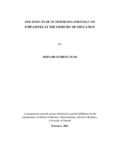| dc.description.abstract | Competitive pressure due to changes within the environment has made outsourcing to be
seen as one of the strategies used by most organizations. The derivative impact of
outsourcing on the human side of the organization, especially its impact on employees,
has been only scantily researched. A move to outsource means that employees will be
transferred from one company and/ or department to another or made redundant. The
objective of the study was to determine the positive and negative effects of outsourcing
strategy on employees at the Ministry of Education.
The literature covers areas on the theories of outsourcing with special emphasis on the
transaction cost theory and resource based theory. The reasons for outsourcing and its
positive and negative effects on employees are also highlighted. The research targets 220
management and other staffs of the Ministry of Education (MoE) headquarters who were
stratified into senior managers, middle level managers and other employees. Descriptive
survey research design method was adopted and a sample size of 100 out of the targeted
220 respondents was requested to participate in the study of which 57 employees fully
participated in the study. Data was collected by way of a questionnaires which were
administered through drop and pick method. The questionnaire used in this study
contained open – ended and closed questions. Data analysis was accomplished using
Statistical Package for Social Scientists (SPSS). Descriptive statistics was used to
summarise the data and the results presented using frequency distribution tables, charts
and graphs.
The study established that outsourcing strategy has posed some effects on employees at
the MoE. The findings revealed that outsourcing strategy leads to access of specialized
skills and inputs, enables employees to be experts in their professions, improves customer
care, quality service delivery and leads to more career opportunity in terms of job
progression. It also increases risks due to insecurity like theft and mistrust, reduces
employees’ morale, job satisfaction, demoralizes employees and reduces innovation and
operational risk. Some of the reasons that have compelled MoE to outsource its services
include its cost savings and efficient service delivery.
The study is the first in the field of the effects of outsourcing strategy on employees at the
ministries and recommends further research on its effects on employees not only in the
ministries but also other sectors. | en_US |



